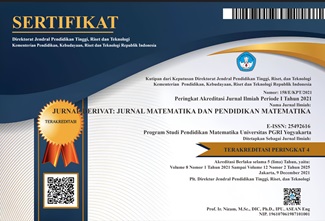Analisis Kemampuan Spasial Pada Bangun Ruang Sisi Datar Ditinjau Dari Perbedaan Gender
DOI:
https://doi.org/10.31316/j.derivat.v5i1.147Abstract
Spatial ability is important in studying the solid geometry. A person who has good spatial skills will easily imagine objects in three dimensions. Factors that influence the different strength of students one of which is the gender difference. This study aims to analyze students' spatial skills judging from the student gender differences. This research is descriptive qualitative that is collecting data in the form of description or sentence. The approach of this research is a qualitative approach. Research subjects in this study consisted of 4 students of class VIII C SMP Negeri 2 Trenggalek. The technique of collecting data of this research is observation, test, and interview. Test results and interviews are analyzed based on the spatial ability, they are the ability of imagination, conceptualization, problem-solving, and pattern searching. The results showed that: male students (1) able to solve the problem using the help of images and illustrate the solution; (2) able to connect data that is known to the concept possessed; (3) able to see problems from different angles; and (4) able to find patterns in solving problems. While female students showed: (1) able to solve the problem using the help of images; (2) able to mention known concepts.
Key Word: Gender, Polyhedron, Spatial AbilityDownloads
Published
Issue
Section
Citation Check
License
Authors who publish with this journal agree to the following terms:
-
Authors retain copyright and grant the journal right of first publication with the work simultaneously licensed under a Creative Commons Attribution-ShareAlike 4.0 International License that allows others to share the work with an acknowledgment of the work's authorship and initial publication in this journal.
- Authors are able to enter into separate, additional contractual arrangements for the non-exclusive distribution of the journal's published version of the work (e.g., post it to an institutional repository or publish it in a book), with an acknowledgment of its initial publication in this journal.
- Authors are permitted and encouraged to post their work online (e.g., in institutional repositories or on their website) prior to and during the submission process, as it can lead to productive exchanges, as well as earlier and greater citation of published work (See The Effect of Open Access).







